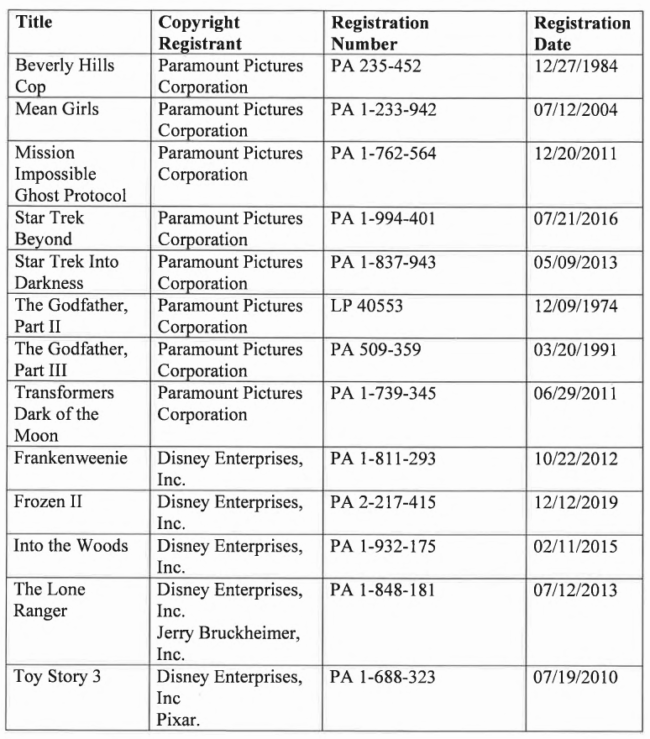Film and TV giants su ‘Pirate’ Nitro IPTV for ‘massive’ copyright infringement *TorrentFreak

 Online streaming, torrenting, and direct download sites have been targeted by the entertainment industries for years, but the rise of subscription-based IPTV services is now seen as a major threat to the business.
Online streaming, torrenting, and direct download sites have been targeted by the entertainment industries for years, but the rise of subscription-based IPTV services is now seen as a major threat to the business.
These services, available for a relatively small monthly outlay, can (reliability permitting) not only replace licensed TV packages, but also video-on-demand services like Netflix and Amazon Prime Video. Given the wide range of content on offer, they’re also competing with physical Blu-ray sales and even titles still in their theatrical windows.
Perhaps one of the most popular IPTV brands in this space is Nitro TV / Nitro IPTV but it remains to be seen if this will remain the case in the coming weeks and months. Late Friday, a coalition of entertainment industry companies filed a lawsuit against Alejandro Galindo, the presumed operator of Nitro TV, along with 20 additional defendants.
The lawsuit, filed in California District Court by companies owned by Columbia, Amazon, Disney, Paramount, Warner and Universal, alleges that Nitro TV offers subscription packages consisting of thousands of “live and curated TV channels” available 24 hours a day, seven days a week, in All over the United States and abroad.
Channels available on Nitro TV include many of the world’s most popular TV shows and motion pictures such as The Office, Spider-Man: Homecoming, Toy Story 3, Star Trek Beyond, Homecoming, and Joker, including works that are copyrighted or exclusively owned by plaintiffs control,” the complaint reads.
“Plaintiffs and/or their affiliates have invested and continue to invest significant resources and efforts each year to develop, produce, distribute, and publicly perform their copyrighted works through legitimate market channels that collectively create a safe and trusted content ecosystem for consumers.
The report continues “Defendants’ unlawful conduct in directly operating Nitro TV and willfully corrupting this ecosystem by seeking to gain illegitimate profits from the gross and flagrant infringement of Defendants’ copyrighted works.”
Noting that the service can be accessed via the web, mobile devices, and smart TVs, the lawsuit continues with an overview of Nitro TV’s business model.
At least in part, the marketing is done through a Facebook group, with defendant Alejandro Galindo allegedly in charge. The group is described as a platform for promoting Nitro TV subscriptions, with Galindo accused of using it to solicit, encourage, and facilitate abuse. It also doubles as a way to expand the number of people who resell Nitro TV bundles to end users.
“Among other things…[.]… Defendants used this Facebook Group platform to notify subscribers of new Nitro TV channels and program offerings, to provide subscribers with updates about the Nitro TV platforms, and to invite subscribers to post TV shows they wanted added on the Nitro TV Facebook Group page. to Nitro TV,” the companies add.
According to the complaint, TekkHosting.com is the “primary interface” through which users can obtain Nitro logins, which are obtained in one of two ways – either through direct purchase or from a Nitro TV reseller. These vendors, essentially middle men, buy “credits” from Nitro which are then transferred to end user accounts, “usually” sold for $20 per month for two devices.
One of the defendants’ sellers recently bragged about the success of their resale efforts: “More than 45,000 customers have been activated in the past 12 months.” “This is just one Nitro TV distributor. There are dozens of them,” the complaint notes.
Once registered, these customers gain access to an expanded service offering thousands of channels and video-on-demand libraries via convenient interfaces.
Live TV channels are broadcasted in sync with the original source of the TV broadcast. In other words, the TV program broadcast on a TV channel (eg, FX, Disney Channel, Paramount Network) through an authorized source (eg, cable player, satellite TV provider) is available on Nitro TV platforms at the same time. Many TV channels include these copyrighted works.” (sample below)

While the “thousands” of live channels being made available without the proper license is obviously controversial, at this point that aspect doesn’t seem central to the complaint. Instead, it focuses on Nitro’s VOD services and its so-called ’24/7′ channels.
Nitro subscribers have the ability to select a “catch-up” feature in which they can watch shows that have aired within the past two days, on Disney Channel or the Paramount Network, for example. The lawsuit claims that this type of video-on-demand service is “only possible by copy programming.”
24/7 channels are offered by many IPTV services and usually consist of episodes of a single show or even a single movie played in a continuous loop. For example, the lawsuit highlights Peaky Blinders and Friends in the TV category and Spider-Man and Captain America in the Movies section.
Given the reach and scale of Nitro’s service, film and TV companies believe it is undermining not only their own business models, but also those of their partners. This includes legitimate online services that pay for licenses to view content that Nitro gets for free.
“This unfair competition undermines the legitimate market for online streaming content, a strong and growing part of Plaintiffs’ business and an important choice for many consumers,” they add, noting that Nitro creates market confusion by misleading people as to what is legal and what is not. .
“Nitro TV subscribers and potential subscribers may mistakenly view Nitro TV as a legal, sanctionable alternative to its authorized and licensed distribution outlets, when it is not. This harms the market for legitimate services by distancing users from legitimate plaintiff licensees.”
Alleging willful copyright infringement, the film and television company’s plaintiffs are seeking either damages and the defendants’ profits in amounts to be proven at trial or statutory damages of up to $150,000 per work infringed.
To address the possibility that Nitro may allege that third parties are responsible for infringement of performance and reproduction rights under copyright law, the companies point out that the defendants still “willingly and materially contribute to that infringement” so they are liable for the contributing copyright infringement. As such, plaintiffs can claim damages, Nitro profits, or statutory damages of up to $150,000 for each infringed work.
The complaint also alleges that Defendants in Nitro and Doe knowingly cause infringement by “providing and promoting use of the Nitro TV Platforms to connect customers to unauthorized online sources that broadcast Plaintiffs’ copyrighted work, and by soliciting, encouraging, and promoting use.” Nitro TV for copyright infringement.” Again, statutory damages of up to $150,000 are sought.
Finally, the lawsuit requires preliminary and permanent injunctions not only against all of the defendants, but also against the third-party companies.
They include Namecheap and Domain.com, the domain registrars for Tekkhosting.com and NitroIPTV.com respectively. They are required to keep WHOIS records “unaltered” for domains, change their name servers to those controlled by plaintiffs, prevent transfers of domains, and keep all evidence of them.
Eventually, the movie and TV show companies seek control of all Nitro domain names.
The full complaint along with a sample list of movies and TV shows can be found here and here (pdf)
